Ladies and gentlemen and beings of indeterminate provenance! I present to you the MRGN post of a thousand and one follies, jollies and lick ‘em lollies: 1997’s The Fifth Element! Supergreen!
Previous entries can be found here. Please note that as with all films covered on the Nostalgia Rewatch, this post will be rife with spoilers for the film.
And now, the post!
Probably the best (and most appropriately nostalgic) way to sum up the diversity of reaction to The Fifth Element when it was originally released is what happened the first time I saw it in 1997, 20 years ago. (Jeez.) I went to see it in the theater with my friend Parag, in Austin, Texas. Both of us went in not knowing much more about it than that it was science fiction and starred Bruce Willis. Needless to say, The Fifth Element was nothing at all what either of us had expected.
I was rapt. Parag fell asleep.
One of our favorite things to argue about for the rest of college, thereafter, was why he was so wrong to say the movie was awful, and I was so wrong to say it was awesome. This argument never got anywhere, of course, but that was okay, because “getting somewhere” was never the point of any of our arguments. I miss ya, Parag.
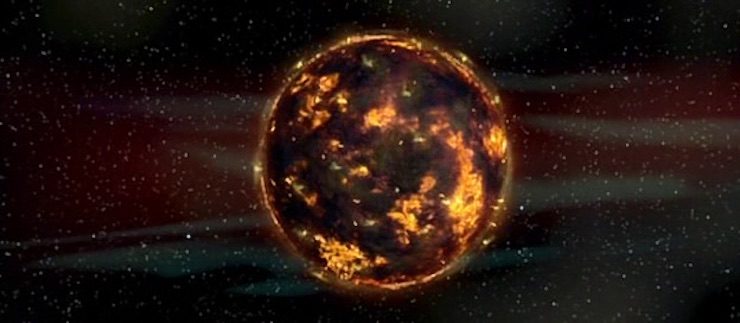
And the thing is, we really should not rag on my friend for hating on The Fifth Element (or, well, not rag on him much) because from a certain point of view it is an awful movie. The plot, for example. To say the plot of this film is “simplistic” is probably an insult to simple things. I mean, the story can literally be summed up as “giant ball of evil comes to destroy the world; giant ball of evil is stopped by the power of love”. I’m all for not over-complicating things, but wow.
It’s also pretty easy to see how the crazed rainbow filling of that Wonderbread plot sandwich could be offputting as well, especially when it crashes into the expectations one may justifiably be harboring about “a science fiction movie starring Bruce Willis”.
Let’s just say, growing up in the 80s and 90s gives you some very definite parameters for what constitutes A Bruce Willis Movie, and other than the gun-heavy mayhem, The Fifth Element fulfills just about none of them.
KATE: The movie puts him in a backless orange ribbed tank top, for Christ’s sake.
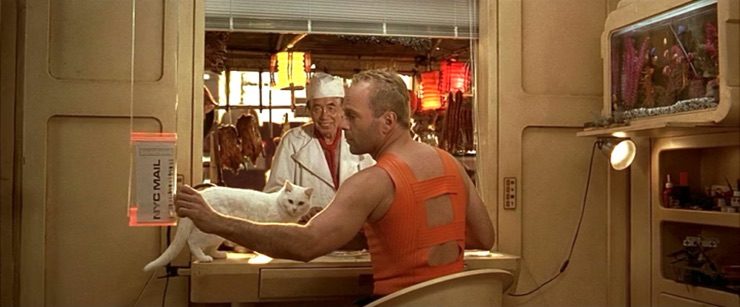
LIZ: Didn’t make him any less sexy.
No, no it did not, mostly because there is just about nothing in existence that can lessen that man’s sexy. But the choice to dress Bruce frickin’ Willis, who is right up there with John Wayne in the Quintessential American Rugged Masculinity Sweepstakes, in an outfit that so clearly gives the middle finger to American ideals of what a Rugged Man Hero would wear, signals without doubt that this movie is not even remotely interested in catering to the expectations that the largely American-dominated action/sci-fi movie genre has ingrained in us all. Jean Paul Gaultier is a gift to humanity for this costuming decision alone, let alone all the others.
The presence of Bruce Willis (and an entire cast of largely non-French actors) does just about zilch to mitigate how intensely, screamingly French The Fifth Element is. Even Bruce Willis himself seems baffled by the sheer Frenchness he is surrounded by, and I have to confess one of my favorite things about this movie is how Willis wanders through it with a bemused WTF look on his face pretty much the entire time. It is hilarious.
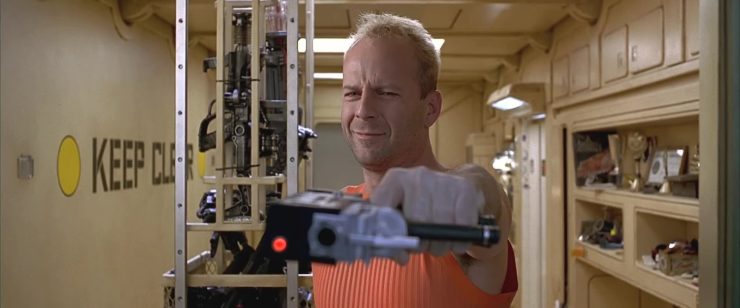
Basically The Fifth Element is so French, I am surprised that you couldn’t see the Eiffel Tower from every spaceship window. And that’s something that you’re either going to find awful, or find awesome.
I thought it was one of the most wonderful things I’d ever seen. And my sisters agree.
I just don’t think a big-budget sci-fi action American film in the 1990s (hell, an American action movie now) would ever have dared to have characters so blatantly eccentric, to have costumes so boldly outré (French, y’all!), to be not just willing to subvert sexual and gender norms but to be downright gleeful about bouncing up to those norms and smacking them in the face with a feather boa. The latter being best exemplified, of course, by the incomparable Ruby Rhod.
I admit that I was… nonplussed with Chris Tucker’s character, the first time I saw this. I had never seen anything like him at the time; 1997 was a long time before queer or non-gender conforming characters became a common sight in American entertainment, and therefore I had very little context for him available to me – and most of the context I did have was unflattering, at best. Ruby made me uncomfortable, for reasons I understood, but only inarticulately. But once I did reach greater clarity on those reasons, I realized that Ruby Rhod was one of the most brilliantly subversive characters to ever appear in mainstream cinema, and I have adored him ever since.
On the surface, Ruby appears to be just outrageous (verging-on-obnoxious) comic relief, and he certainly is that, but the underlying implications of his character are much more subtle, and they get more amazing the longer you think about them. He is the essence of the term “genderqueer”, in a time when that concept barely existed in the mainstream consciousness (much less was accepted by it). Other than that he is definitely referred to with the male pronoun, Ruby rejects conformity to either male or female traditional gender markers with palpable contempt. But the most amazing thing about him is that he receives no censure for this. His demeanor and style is not only accepted without question by the other characters, he is in fact galactically famous for it, and apparently is one of the biggest celebrities of the time. Think about that for a minute.
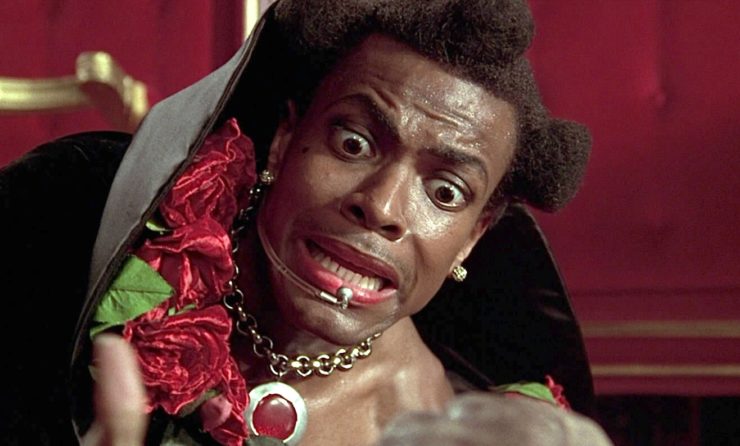
None of the humor he is the target of is related to his queerness, either. This is harder to explain, because certainly we all laughed at his histrionics –
LIZ: THAT SCREAM WAS THE BEST SCREAM
– (true), which could be viewed as mockery for his effeminate mannerisms, but somehow it didn’t feel like that’s why we were laughing. I dunno, maybe someone else could explain it better than me. Or maybe I’m wrong. But even if I am, Ruby’s mere existence demonstrated a far bolder willingness to imagine how the future will be truly different than the past than any amount of flying cars or spaceships ever would.
LIZ & KATE: Leeloo Dallas Multipass!
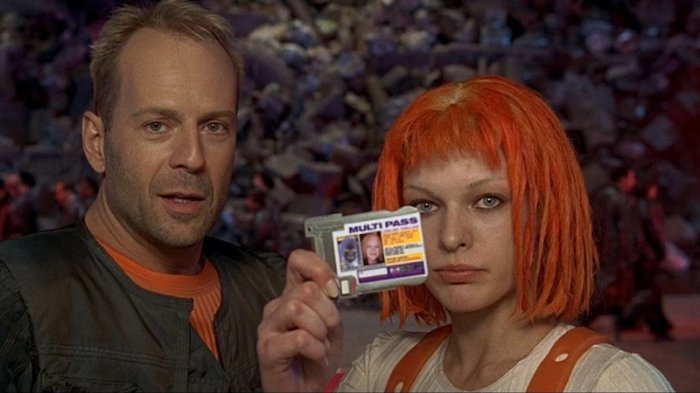
We also have to talk about Leeloo, of course. The internet tells me that Leeloo was originally supposed to have been played by Julia Roberts (and Korben was supposed to be Mel Gibson, eek), which means that Fifth Element fans dodged the world’s biggest miscasting bullet. I am not a Julia Roberts hater, particularly, but there is no way in the world that she could have made this character work the way Milla Jovovich did. Milla, for all her tiny beauty, has an undercurrent of feral wildness that has made every role I’ve ever seen her in unforgettable, and she is utterly convincing in any ass-kicking context.
Leeloo’s ass-kickingness was not quite the revelation Ruby Rhod’s character was (female action heroes may have been relatively sparse overall compared to their male counterparts, but it certainly wasn’t a new idea), and it was a little annoying that apparently even in the future unconscious gender assumptions are still the norm (evidenced by the played-for-laughs revelation of the body-rebuilding scene, where everyone is pruriently amazed that the Supreme Being is a chick), but nevertheless I enjoyed the hell out of Leeloo and her cheerfully odd mix of naiveté and wisdom.
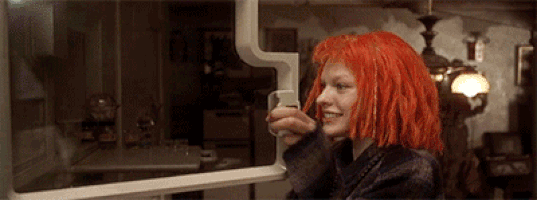
The argument can certainly be made (and it has been) that the film both damsels and infantilizes her, but I don’t necessarily agree. The film was trying to make the point that Leeloo was both strong and fragile, and needed support as well as freedom, and that’s something I can get behind, as a rejection of the toxic masculinity trope that true heroes are entirely self-sufficient loners who can do anything and never need help. Leeloo may not take the prize for the most feminist representation of an action heroine ever, but she was a better attempt at it than many of her fictional peers.
KATE: What I don’t understand is, if the Mondashawans were planning to bring her to Earth all along, why wasn’t Leeloo educated in our language and history and stuff beforehand?
LIZ: Because she was still in the coffin thingy.
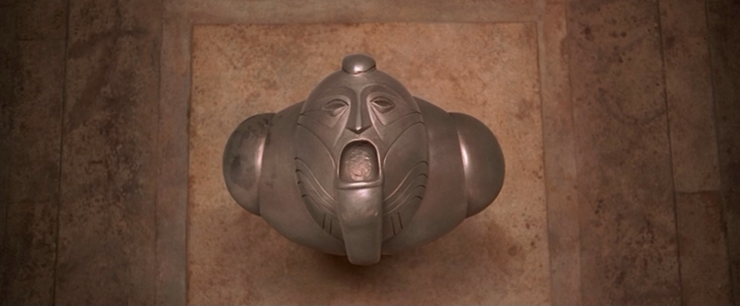
KATE: Nuh-uh, the gauntlet they rebuilt her from was holding a throttle from the ship!
We soon realized, though, after seeing a shot of the case delivered to Zorg that shows one of the handles torn off, that the gauntlet must have been holding the stones case, not operating the ship. So she’d been asleep all this time. Which makes sense as long as you don’t think about it too closely.
LIZ: More sense than why a planet-sized ball of evil would communicate with its henchmen via AT&T, anyway.
KATE: Or why that would make you leak black goo from your forehead.
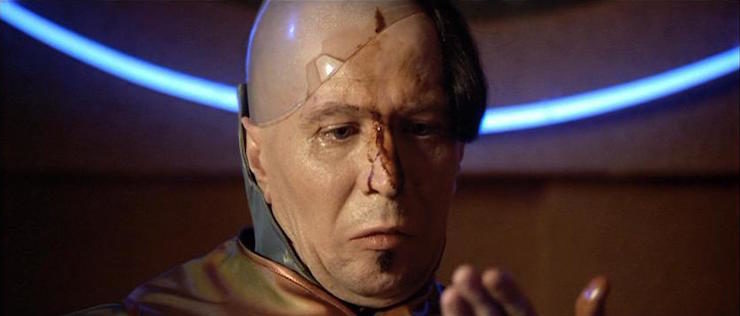
LIZ: I thought that was blood.
KATE: That doesn’t make any sense either!
ME: Guys, don’t look at the plot. Turn away from the plot, please.
Fun fact: the hero and the villain of TFE (Willis and Oldman, respectively) not only never interact with each other, neither one is ever even aware of the existence of the other. I don’t know if that also counts as a plot flaw or not, but it is certainly interesting to think about re: story structure.
Also, the diva scene.
This scene is ridiculous. It was ridiculous then, and it is even more ridiculous now, with the very 90s electronica dating it. I do not care in the slightest, and it remains one of my favorite things ever. I still get chills every time I watch it. Fight me.
Another fun fact: the aria the Diva sings is generally considered to be one of the most difficult in opera, and the techno part is designed to be actually impossible to perform by a human. This has since proven, amazingly, to not be true. Wow.
Also, Luke Perry is in this movie for some reason.
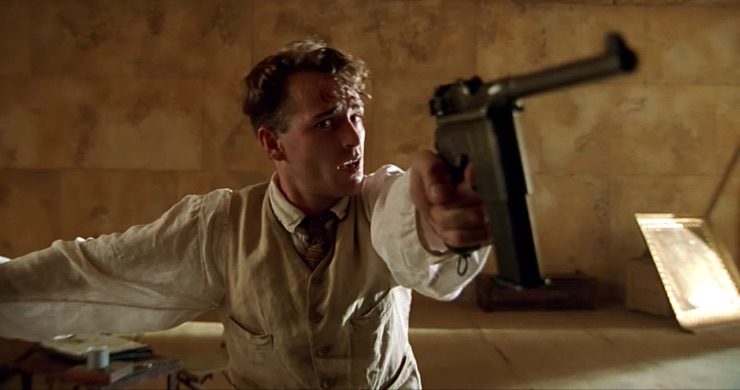
LIZ: Tiny machine gun! It’s adorable! Is that a Luger?
ME: I… have no idea?
LIZ: I’m going to be so impressed if I got that right.
(She was not right, though her choice would have been a lot more historically accurate, since Lugers were actually around in 1914. Turns out Perry’s gun was a Mauser M712 Schnellfeuer, and counts as an anachronism, because it didn’t exist until the 1930s. Oh well.)
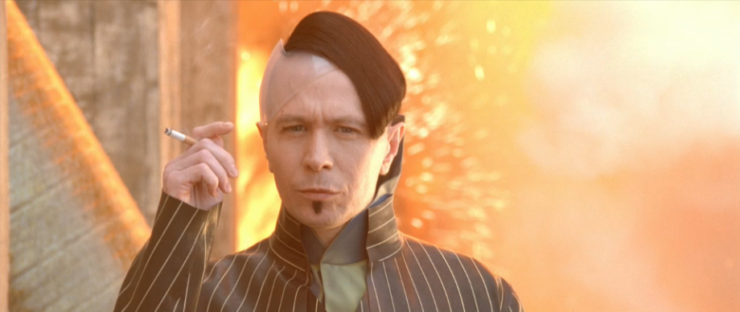
Luke Perry aside, though, the reason this movie worked is because of – well, many things, but mostly (in my opinion) that its actors had the talent and the courage to commit to its general insanity. Gary Oldman may not have understood exactly why he was wearing Tupperware on his head while being cartoonishly evil, and Chris Tucker may or may not have really believed that Ruby Rhod could be an intergalactic superstar, but they committed to those characters being those things. Everyone in the cast, even Willis, played the shit out of their characters, and that’s why everything else worked.
If you want a demonstration of how vital that commitment and talent is to making something like The Fifth Element work, look no further than Luc Besson’s failed attempt to recreate it, Valerian and the City of a Thousand Planets – or rather, don’t bother. Emmet Asher-Perrin explains why with wonderful accuracy, but for my own part I’ll just say my time and money would have been much better spent going to see Wonder Woman again. Shame.
That said, Besson’s more recent failures do not mitigate my love for his earlier successes, of which The Fifth Element is by far and away my and my sisters’ favorite of his films. No matter how many times I see it, I can always watch it again. The Fifth Element was spectacle, it was fashion, it was absurdity, it was bright colors and strange French humor and unashamed audacity. Even twenty years later, it is unique, and likely always will be.
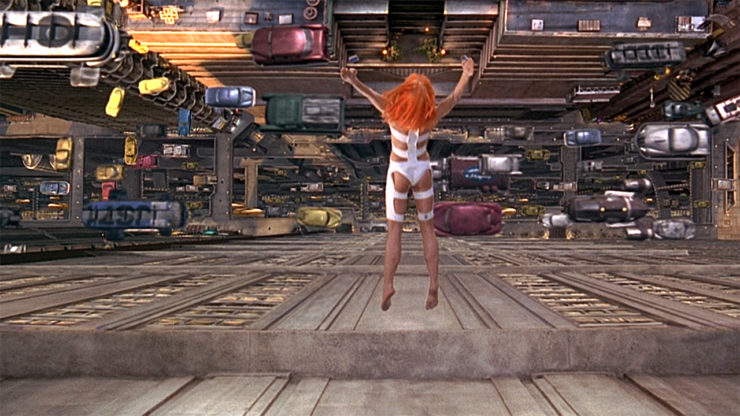
And now, our patented MRGN Nostalgia Love to Reality Love 1-10 Scale of Awesomeness!
Nostalgia: 8.5
Reality: 9
And that’s all, folks! FOR NOW. Come back for more soon!










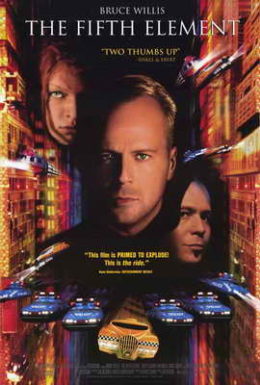
This movie was discussed about half a year back in another tor.com article. Nice to see that it is now featured here as well.
It might have some flaws, but I have always loved this movie, it’s fun and light and who could forget Multipass!
This is worth a look for an interesting take on this movie and the Bruce Willis legacy: The Fifth Element: Movies with Mikey
I loved this movie! Ruby Rhod was one of my favorite characters.
I’m surprised how novel you found The Fifth Element, because to me, it seemed to pick up a lot of style from stories that appeared in Heavy Metal/Metal Hurlant. And many of those took inspiration from Jodorowsky+Moebius’s Incal and Jodorosky’s Anibal 5, both of which had been out for decades by the time The Fifth Element came out. I guess being a retro-future gave it kind of a timeless look to you?
Edit: now that I think of it, the plot has many similarities to The Incal too.
Fun fact:
Literal translation of the Schnellfeuer is the “fast firer.”
Fun read as always, Leigh. I love this movie.
I guess Ruby would be something new, if you weren’t familiar with Prince or David Bowie. He seemed to be some combination of their personas, I thought, with the usual Chris Tuckerisms.
I agree with vinsentient @@.-@ about the strong influence of Metal Hurlant on this film.Which, of course, raises the question of whether TFE or Heavy Metal makes better use of its inspiration (he hinted broadly). This film definitely better captures the overall feel better, some of the Heavy Metal segments get the look. I think I’d give the edge to this one.
Also “outrageous (verging-on-obnoxious) comic relief” describes a lot of Chris Tucker’s roles, even when he’s one of the leads, like in Rush Hour.
Love the movie, love the flaws, fun story. Thanks for the re-watch!
Great article Leigh. Really agree with you about the movie. Very European in character and everyone in it is having such a go that the viewer can barely get their breath back, let alone have the time to notice its flaws.
About the black goo on Oldman’s head- I always took it as a given that it was hair dye leaking because he was sweating so much. IIRC, in the scene just prior he was portrayed as the evil master of his universe and his sweating/dye leaking was to contrast just how much more evil and bigger the real big bad was.
This is only one of a couple of films I have seen multiple times in the theater. I remember like it was yesterday, and not 7300 yesterdays ago… Thanks for summing up the beauty of this sci fi masterpiece; and it certainly is a masterpiece. I’m really sorry to hear all the negative reviews of Valerian, because I was hoping this was my past two decades coming full circle, with a return to the “world” of The Fifth Element, if that makes any sense. I have already watched TFE several times this year, as I approach 40 my nostalgia is bouncing off the walls.
You also have to throw some love on papa priest and baby priest. They both were perfect in their parts.
Granted, it’s been a long time since I’ve seen this, and I was much like Parag when I did (i.e. bored), but remind me again how is Ruby Rhod queer?
Yes, he dresses in a counter-gender fashion, but I recall there were several ladies with whom he engages in a sensual semi-erotic fashion while on the air, but don’t recall him ever doing the same with a male character. Maybe I’m forgetting?
To me, he didn’t read as queer at all at the time – rather he read as a parody of what I call celebrityism – the fetishizing of the celebrities by fans/audience. Ruby does what does – dresses differently, romances ladies in extreme fashion, being loud and bombastic – because that what his audience wants and that’s what he can get away with. He’s on air almost non-stop, the way that celebrities almost were having (and are still having) to behave in public to satisfy their fans. He’s a performer who is SO of the top that it can be read as parody of the 1990s, when the real paparazzi had started. This was made in the era just post-Prince Di, concurrent with the Jennifer Aniston craz, when audiences/fans were finally starting to engage in such extreme detail with the nuances of their chosen celebrities.
Am I wrong in thinking this calling him queer is just a revisionist viewpoint?
I’m fine if people want to use his character as an example of sci-fi embracing the new or different. I’m fine if viewers want cite this portrayal as a way to continue to champion for greater inclusion and tolerance. But, unless I’m missing something from my memory of the film (which I very well may), I just don’t see it the way Leigh is describing; I don’t think that was what the film makers intended.
When I first got a DVD player (well, a PS2) I didn’t want to replace all my favourite VHS films but 5th Element was my first choice as to what would be worth seeing in higher quality.
I love everything about this movie. I had it on VHS, but it was the first DVD I bought, and the first Bluray. I regret nothing.
I also adore the soundtrack/score.
Thanks for the rewatch. Delightful as always.
[fistbumps ChocolateRob who posted while I was typing]
youngheart80 @12:
“Genderqueer” does not mean the same thing as “gay”, “bisexual”, or any other identifiers of a person’s sexual orientation. The definition of it is “a person who does not subscribe to conventional gender distinctions but identifies with neither, both, or a combination of male and female genders.” Ruby presents himself as having gender traits that are both stereotypically male and ones which are stereotypically female, and varies between them at will. This is an entirely separate question from what genders he does or does not find attractive.
Cheerio @6:
Yes, you are right that Ruby was not a new thing in this regard (and fun fact, the role of Ruby was originally designed for Prince), but Bowie and Prince were musicians much more than they were ever actors, and the music industry has historically been much more forgiving of gender nonconformity than Hollywood. All I can tell you is that in 1997, Ruby Rhod was a revelation to me even if he shouldn’t have been.
I love this movie, probably more than it deserves; and I’ve probably purchased it more times than any other in my collection (as they kept releasing newer & more improved versions — I think there were at least two DVD releases and two Blu-ray, and I may be forgetting some iterations; and I now own it in glorious 4K although I haven’t had a chance to watch that yet).
Some friends & I are doing an MS Mud Run later in August — our team name (for which I take full credit): The Filth Element. I even got myself a sleeveless orange running shirt, although it’s neither backless nor ribbed.
@12 Count me as in agreement with you on Ruby Rhod. I saw him as Prince to the power of 1000. There scene of him with one of the flight attendants on the way to Floston Paradise seems pretty proof-positive that he enjoyed sexual congress with a woman. And I agree, I don’t recall him acting the same way toward any men. While he wasn’t afraid to describe Korben as attractive to his radio audience (at least, that’s what I assume “Fueled…LIKE FIRE!” means), he immediately follows up with a very hetero “So start melting ladies…”
Calling him “queer” does seem a bit like revisionist interpretation to me.
KalvinKingsley @17:
Again, “genderqueer” has nothing to do with who a person likes to sleep with.
@18 Leigh – I simply feel that Ruby did, in fact, subscribe to conventional gender distinctions. His treatment of the flight attendants (all women, and generally all objects of his desire) and of Korben (male, so he needs to describe him as studly, having the “right arms, right ON!” and warning ‘ladies’ to be ready because Korben is not just hot but HOT HOT HOT!) put this out there pretty clearly, to me.
Him being flamboyantly effeminate with a high pitched voice didn’t make me think of him of someone who felt his identity was neither male nor female – he seemed rather overtly hetero male. That he had “traditionally female” reactions to things (the screaming, dear lord the screaming) didn’t change my view of that.
Again, he seemed like Prince on steroids in my book. But we all see things differently at times, don’t we?
KalvinKingsley @@@@@ 19:
It’s interesting that you keep using Prince as a refutation of my assertion that Ruby is genderqueer, when in fact Prince is a genderqueer icon.
@11 The priests are gold.
@19 His clothes, his phallic mic thing, his mannerisms, and his entourage seems pretty queer to me. The only thing straight about him is his reaction to women.
I adore this movie, flaws and all.
Oh, and the role of Ruby was intended for Prince, hence the similarities.
The Fifth Element is one of my favorite movies of all time. It just feels so vibrant and fun.
Saw Valerian last weekend. Despite what the critics say there’s quite a lot to like. Though the leads are so miscast.
My husband and I both unironically love this movie, “thermal bandages” and all.
I want to give a special shout-out to Korben Dallas’s neighborhood. He lives in a cheerfully painted automated apartment, everything designed to pack maximal function into minimal space. He can open one of his own walls up to have an anti-gravity food truck (tricked out like a 20th-century diesel sampan, just for fun) bring him freshly prepared meals. He even has a pneumatic tube for the delivery of small objects directly to his home.
But there are specially painted assume-the-position markers on the walls.
I gather from the behavior of his neighbors that the entire floor, if not the entire building, is meant for single occupancy and every apartment has those markings.
Yikes.
Oh goody, time to bust out my firearms knowledge.
Luke Perry’s pistol is wrong but it’s really close to being right. The M712 was just an updated version of the legendary C96 “broomhandle” Mauser from 1896. It’s basically the same gun with just two major changes. The M712 added the long detachable magazine instead of the C96s integral magazine and was select fire (could be fired in both semi or full auto). So basically they picked the right gun, just the wrong version.
Interestingly, the majority of M712s produced went to China. China had strict import bans on military rifles and sub-machine guns but pistols could be brought in. An M712 with a detachable shoulder stock makes a pretty good sub machine gun but could be imported as a pistol.
The C96 is the base for Han Solo’s blaster.
Now I need to rewatch this to cleanse my pallet after the dumpster fire that was Valerion.
I LOVE this movie & yes to #11! Must admit her tattoo is the only tattoo I’ve ever remotely considered getting….
The actor playing the general was Leon in Blade Runner I believe & a nice touch with all the heavy visual influence. I won’t wax pedantic, but one can certainly read the movie as having a serious subtext of answering or responding to Blade Runner. I think that subtext is there, but mostly I just enjoy the film.
While Bruce Willis may be known primarily for doing action movies, if you look at his actual filmography, the list of science fiction movies — or rather “genre” movies — that he starred in prior to The Fifth Element consists of Hudson Hawk, Death Becomes Her, and (just two years earlier) Twelve Monkeys.
@9 Except that in the scene where we first see the dark planet, the same thing happens to the General (not sure why he’s not an Admiral) who tries to destroy the planet, right before the planet destroys him — and he most definitely does not have black-dyed hair. Also, the goo looks much too dark to be blood (or at least not healthy, fresh blood). I always thought it was meant to be a manifestation of the evil infecting their minds.
(Incidentally, I looked up that clip on Youtube to double-check the General’s appearance, and I thought I recognized one of the background characters. Sure enough, it was Tim McMullan, whom I recently saw as Arthur Valentine in the most recent series of Foyle’s War. And the General is played by none other than John Neville, aka the Baron von Munchausen.)
“Fun fact: the hero and the villain of TFE (Willis and Oldman, respectively) not only never interact with each other, neither one is ever even aware of the existence of the other. I don’t know if that also counts as a plot flaw or not, but it is certainly interesting to think about re: story structure.”
I never noticed this until it was pointed out by the previous article on Tor, celebrating the movie’s 20th anniversary. And I think it’s absolutely brilliant, precisely because it subverts our expectations for a movie that has a hero and a villain.
@31,
The whole not meeting each other thing isn’t unique. In ST Wrath of Khan, Kirk and Khan are never physically in the same place. Its hard to pull off dramatically, but I think both movies did it very well.
Matthew @@@@@ 30
Yep, you are right- it’s clearly not hair dye.
13. ChocolateRob, my first DVD player was also a PS2, although my first DVD was Highlander (which I’m hoping makes it on a future entry of the MRGN)
As for this movie, I loved then and I love it now. Its high time I watched it again as its been a while since I’ve seen it. I’m actually really disappointed in the reviews for Valerian as I also thought that would be a continuation of the greatness of The Fifth Element. Oh well, we’ll always have this movie.
Any chance of a look back at Leon: The Professional in addition to your future look at Highlander? :)
Agree with everything in the article, and want to add that something that often gets overlooked is how funny Milla Jovovich is as Leeloo. It’s easy to imagine, with a different actor, the character still being the same sort of earnest warrior-waif, but a lot less interesting. But there’s this quality of droll humor in Jovovich’s performance that runs right through the movie, even though she also never stops being an earnest warrior-waif. It’s really a very meticulous comedic performance.
The movie theater I went to most in the ’90s used to have film summaries up on screen before the previews, where you could have fun guessing whether the plot up there was from a real movie or not (called Plot or Not?). The greatest one they ever had said “New York taxi driver saves Earth from an evil giant ball of goo- Plot or Not?”. That pretty much sums this movie up.
That said, I love love love this movie. And it is absolutely awful. But in a good way. It is probably my tavorite Besson film (even if Leon is a much better movie). The casting is phenomenal. And Chris Tucker will forever be Ruby Rhod in my heart, even if I knew him better as Smokey from Friday.
I love this movie to bits!! Milla Jovovich’s pure, unadulterated delight at that CRAY-ZEE Polynesian arrival welcoming celebration in the Space Hotel is a thing of beauty and makes the whole movie, dopey bits notwithstanding.
I do think that they could have dropped Mrs. Dallas (Corben’s mom), though – that was a very negative caricature of an overbearing Noo Yawk mom.
But, like Leigh, I still thrill to Plava Laguna (I used to have it as a ring tone back when I had a shiny metallic pink Razor phone before I realized how annoying it was for other people). There is an odd bit of low budget special effects, though when those vibrating space vermin thingies drop out of the landing gear of the spaceplane. They were literally just those weird jumpy-vibrating bobble toys covered in goo(?).
@vinsentient: According to one of the features on the original DVD of The Fifth Element, the character of Korben Dallas was based on Zaltman Bleros, a character that Luc Besson came up with while still in high school.
The following merchandise is what I would have loved to have seen by made from this movie:
Model kits of the NYPD police cars, the shuttle that goes to Fhloston Paradise, Fhloston Paradise itself, Zorg’s ship (which was also the same type of ship that was lent to the Mangalores for them to destroy the Mondoshewan ship), Korben’s taxicab, and the Federated Territories ship (which looks like a nifty [IMHO] take on a ISD from Star Wars), action figures, plus (if possible) a replica of the ZF-1.
Quick thing on the Diva’s song: It’s near-impossible, but not, as the link implies, because the notes are too high. In fact, Inva Mula, the singing voice of the Diva, sang every note as you hear it. None of it was digitally created. The issue is that she wasn’t able to (and most people are unable to) change notes from high to low and low to high that quickly. They just used a computer to combine different parts together.
@@.-@ and 7. Beside this, TFE is also heavily inspired by Valerian (the original comic book series). Luc Besson has stated that he has been a fan since childhood, and he hired artist Jean-Claude Mézière to work on successive versions of the project. It seems the decision to make Korben Dallas a cab driver was inspired by the flying taxicabs in The circles of power. We got a gorgeous artbook out of the collaboration.
I haven’t seen Valerian and the city of a thousand planets yet, but I have felt since it was announced that it was somewhat unnecessary: Besson had already made the best possible cinematographic adaptation of this universe.
Leeloo and River Tam have totally got to go pub crawling together. I kept expecting the Diva’s tentacles to do something besides hang there and am very disappointed they didn’t.
@41 robbie1998 I have only read two or three of the Valerian volumes, but to me they read like Doctor Who if the Doctor was a French James Bond (or should that be OSS117?) and the companion was a grown up Penny (of Inspector Gadget). Nothing like either Bruce Willis nor Dane DeHaan.
Mind you my French is rusty and Canadian so I must be missing a lot of nuance.
Now that you’ve mentioned it, I wish the Valerian movie had been more of a direct sequel to The Fifth Element set in the same world.
@43 Do you remember which volumes you read? There were several threads in the series. Some books were space-operas, some focused on the time travelling aspect and generally took place on contemporary earth – contemporay at the time of publication anyway. I assume that these would be somewhat similar to Doctor Who. To be honest I have never seen any episode of DW, so I can’t really compare.
In any case, I agree that the characters in TFE are very different from those in Valerian and Laureline. I was thinking of the world-building, especially visually. I felt that both TFE and the ‘spatial’ albums of the series gave the sensation of a rich and varied, sometimes even overcrowed, universe. I can’t think of other examples in their respective medium which do this quite as well.
@11, @21: Another Fun Fact – Ian Holm, who played the senior priest, also played Frodo, in the BBC radio version of Lord of the Rings, and then Bilbo in the Peter Jackson LOTR films.
@42: I too wanted the tentacles to move and be part of her dance – but I guess the budget didn’t run to that. Still one of my favourite SFnal film scenes though. The thing about TFE that keeps coming up here was that despite all the violence and destruction anever lack of plot that made sense, it was FUN. I’m so sad that it seems Valerian hasn’t achieved that.
Another vote for how much fun this movie is. All of the reasons above, plus I’d give a shout out to the soundtrack and sound effects. They interplay with the action so perfectly, every scene has rhythm and movement in a way that keeps the pace up. The only scene that drags a little is Zorg choking on the cherry. Everything else is so quick and energetic, the movie could come on at any point and I accidentally sit down and watch the rest.
The black bile that ran down Zorg’s forehead when he was talking to Mr Shadow was interesting. The same thing happened to General Steadert after he attacked Mr Shadow with nukes. As Mr Shadow approached the ship black bile was coming out from under Steadert’s hat.
It simply represents being touched by evil. Some fans theorize its blood, clearly it’s not, it’s black bile. So for instance if a film maker wanted to represent a Saint that was touched by divinity they might make that character glow with light. Anyone touched by evil would… ooze black bile perhaps? It makes a sort of sense and is a little more original than a trope like glowing red eyes or something.
If you grew up in the 80’s shouldn’t you expect Bruce Willis to be funny in a movie? He was doing sitcoms before he became an action star with Die Hard.
I know I’m late to this discussion, but I love this movie so so much and wanted to add one thing. While granting that genderqueer does not refer to sexual orientation, everyone also seems to be forgetting a line that Ruby has when he’s trying to seduce one of the stewardesses. It’s something to the effect of “I swear, I’ve never felt this way before … with … a human.” Granted, we don’t know from that whether his non-human partners were specifically male or female or if the aliens in question even have binary genders, but I’d say that line makes it pretty clear that Ruby is sexually flexible. I think Leigh hits the nail on the head with this:
@49: shadowcat1017: Not as late as me!
Just needed to say, I think the reason we all enjoy so much about Ruby’s character is that he’s really the every-guy in this film. Not to say that we’re all a bit genderqueer (though I think there probably is a little gender-queerness in most of us), but because the resulting neutrality makes him something of a blank slate: it doesn’t get in the way of our sympathising and/or empathising with him in the way a straight man can sometimes struggle to do with an overtly gay character, or how a woman may struggle empathising with a more traditionally masculine man, possibly (I can’t say I really know how it all works, but it feels like this).
This blankslateyness it gives him allows all of us to appreciate where he’s coming from, as a (superfamous) every(wo)man thrust into this ridiculous, dangerous and terrifying situation. I know most of my friends won’t admit it, but I also think we’d all (me, my friends, 98% of humanity) scream react in pretty much the exact same way as Ruby in the same circumstances (including joining the million-mile high club). I certainly have a number of very traditionally masculine male friends that manage to hit that exact same pitch over things as ridiculous as those tiny little money spiders (and running away from said spiders at practically the speed of light as they do it too). I think we’re all a little bit Ruby.